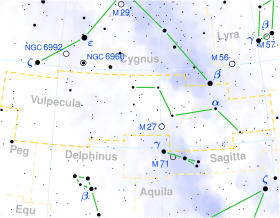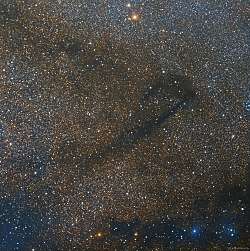Alpha Vulpeculae
Alpha Vulpeculae (α Vulpeculae, abbreviated Alpha Vul, α Vul), officially named Anser /ˈænsər/,[10] is the brightest star in the constellation of Vulpecula. It is approximately 297 light-years from Earth. It forms a wide optical binary with 8 Vulpeculae.[11]
 | |
| Observation data Epoch J2000.0 Equinox J2000.0 | |
|---|---|
| Constellation | Vulpecula |
| Right ascension | 19h 28m 42.330s[1] |
| Declination | +24° 39′ 53.65″[1] |
| Apparent magnitude (V) | 4.40[2] |
| Characteristics | |
| Evolutionary stage | red giant[3] |
| Spectral type | M1 III[4] |
| U−B color index | +1.81[2] |
| B−V color index | 1.487[5] |
| Variable type | suspected[3] |
| Astrometry | |
| Radial velocity (Rv) | −84.91 ± 0.26[5] km/s |
| Proper motion (μ) | RA: –126.13 ± 0.19[1] mas/yr Dec.: –107.44 ± 0.22[1] mas/yr |
| Parallax (π) | 10.97 ± 0.28[1] mas |
| Distance | 297 ± 8 ly (91 ± 2 pc) |
| Absolute magnitude (MV) | −0.36[6] |
| Details[7] | |
| Mass | 0.97 M☉ |
| Radius | 43.14 R☉ |
| Luminosity | 415.9 L☉ |
| Surface gravity (log g) | 1.30 cgs |
| Temperature | 3,690 K |
| Metallicity [Fe/H] | -0.38[8] dex |
| Rotational velocity (v sin i) | 4.6[5] km/s |
| Age | 11.30 Gyr |
| Other designations | |
| Database references | |
| SIMBAD | data |
Alpha Vulpeculae is a red giant of spectral class M1 and has apparent magnitude +4.4. It has been analysed as a member of the Arcturus stream, a group of stars with high proper motion and metal-poor properties thought to be the remnants of a small galaxy consumed by the Milky Way.[12]
Nomenclature
α Vulpeculae (Latinised to Alpha Vulpeculae) is the system's Bayer designation.
It bore the traditional name Anser, derived from when the constellation had the name Vulpecula cum Ansere 'the little fox with the goose'.[13] In 2016, the IAU organized a Working Group on Star Names (WGSN)[14] to catalog and standardize proper names for stars. The WGSN approved the name Anser for this star on 30 June 2017 and it is now so included in the List of IAU-approved Star Names.[10]
Description

α Vulpeculae has evolved away from the main sequence after exhausting its core hydrogen and is now a red giant, probably on the red giant branch.[3] It is about 11.3 billion years since it first formed.[7] It has an effective surface temperature of 3,690 K and a bolometric luminosity of 416 L☉, meaning that its radius is 43 R☉.
α Vulpeculae has been suspected to be variable in brightness by about a tenth of a magnitude, but this has never been confirmed.[15] Analysis of the isotopic ratios in its photosphere show that it has a mass less than 1.5 M☉ and has not yet evolved to the asymptotic giant branch and experienced a third dredge up.[3]
References
- van Leeuwen, F. (2007), "Validation of the new Hipparcos reduction", Astronomy and Astrophysics, 474 (2): 653–664, arXiv:0708.1752, Bibcode:2007A&A...474..653V, doi:10.1051/0004-6361:20078357.Vizier catalog entry
- Mermilliod, J.-C. (1986), "Compilation of Eggen's UBV data, transformed to UBV (unpublished)", Catalogue of Eggen's UBV Data. SIMBAD, Bibcode:1986EgUBV........0M.
- Lebzelter, Thomas; Hinkle, Kenneth H.; Straniero, Oscar; Lambert, David L.; Pilachowski, Catherine A.; Nault, Kristie A. (2019), "Carbon and Oxygen Isotopic Ratios. II. Semiregular Variable M Giants", The Astrophysical Journal, 886 (2): 117, arXiv:1912.04386, doi:10.3847/1538-4357/ab4e9b.
- Morgan, W. W.; Keenan, P. C. (1973), "Spectral Classification", Annual Review of Astronomy and Astrophysics, 11: 29, Bibcode:1973ARA&A..11...29M, doi:10.1146/annurev.aa.11.090173.000333.
- Massarotti, Alessandro; et al. (January 2008), "Rotational and radial velocities for a sample of 761 HIPPARCOS giants and the role of binarity", The Astronomical Journal, 135 (1): 209–231, Bibcode:2008AJ....135..209M, doi:10.1088/0004-6256/135/1/209.
- Anderson, E.; Francis, Ch. (2012), "XHIP: An extended hipparcos compilation", Astronomy Letters, 38 (5): 331, arXiv:1108.4971, Bibcode:2012AstL...38..331A, doi:10.1134/S1063773712050015.
- Baines, Ellyn K.; Armstrong, J. Thomas; Schmitt, Henrique R.; Zavala, R. T.; Benson, James A.; Hutter, Donald J.; Tycner, Christopher; Belle, Gerard T. van (2017), "Fundamental Parameters of 87 Stars from the Navy Precision Optical Interferometer", The Astronomical Journal, 155: 30, arXiv:1712.08109, doi:10.3847/1538-3881/aa9d8b.
- Huang, Y.; Liu, X.-W.; Yuan, H.-B.; Xiang, M.-S.; Chen, B.-Q.; Zhang, H.-W. (2015), "Empirical metallicity-dependent calibrations of effective temperature against colours for dwarfs and giants based on interferometric data", Monthly Notices of the Royal Astronomical Society, 454 (3): 2863–2889, doi:10.1093/mnras/stv1991.
- "HD 20781". SIMBAD. Centre de données astronomiques de Strasbourg. Retrieved 2014-09-13.
- Naming Stars, IAU.org, retrieved 16 December 2017.
- Washington Double Star Catalog, United States Naval Observatory, archived from the original on 2011-02-14, retrieved 17 January 2018.
- Eggen, Olin (1971), "The Arcturus Group", Publications of the Astronomical Society of the Pacific, 83 (493): 271–85, Bibcode:1971PASP...83..271E, doi:10.1086/129120.
- Barentine, John C. (2016), "Anser", The Lost Constellations, p. 35, doi:10.1007/978-3-319-22795-5_3, ISBN 978-3-319-22794-8.
- IAU Working Group on Star Names (WGSN), retrieved 22 May 2016.
- Samus, N. N.; Durlevich, O. V.; et al. (2009), "VizieR Online Data Catalog: General Catalogue of Variable Stars (Samus+ 2007-2013)", VizieR On-line Data Catalog: B/GCVS. Originally Published in: 2009yCat....102025S, 1: B/gcvs, Bibcode:2009yCat....102025S.